Tonkaris, Sayram-Ugam National Park
4 August, 2008, 01:39 am in "Kazakhstan"
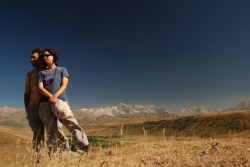 By finding the minibuses to Sayram, we also found the ones going to Lenger, the headquarters of the Sayram-Ugam Ecotourism office. Alikhan, the head, and his son, Oskar, who spoke some English, picked us up at the bus station. Lenger had a busy center with cars zipping around--an accident happened behind us and another car almost hit us as we tried to pull out of the parking place. It seemed like all the cars in the village were hanging out around the bus station. Alikhan and Oscar took us to their house, also a guest house with a yurt in the yard. What I thought would be just a quick 5 minute going over of the details of our visit, became a pleasant afternoon. First we were shown the yurt, tripped out in traditional felt hangings and tassels, with a couple trees growing inside and several non-traditional beds as well as a low table.
By finding the minibuses to Sayram, we also found the ones going to Lenger, the headquarters of the Sayram-Ugam Ecotourism office. Alikhan, the head, and his son, Oskar, who spoke some English, picked us up at the bus station. Lenger had a busy center with cars zipping around--an accident happened behind us and another car almost hit us as we tried to pull out of the parking place. It seemed like all the cars in the village were hanging out around the bus station. Alikhan and Oscar took us to their house, also a guest house with a yurt in the yard. What I thought would be just a quick 5 minute going over of the details of our visit, became a pleasant afternoon. First we were shown the yurt, tripped out in traditional felt hangings and tassels, with a couple trees growing inside and several non-traditional beds as well as a low table.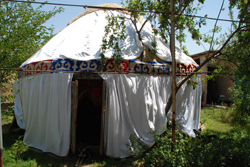
Then they showed us their guest house rooms and sat us down at the computer to show us photos of the park and other tourists enjoying themselves there. Then we went to the yurt and Katya, Alikhan's wife, served lunch and we ate a feast of stuffed peppers, soup, melon, salad from tomatoes and cucumbers fresh from their garden, jam, bread and other goodies. It turned out Rowshan was their first Iranian tourist. We also discussed the difficulties of travel in Kazakhstan and the lack of tourist information. I told them how other countries had tourist info kiosks. They said they had land between Shymkent and Sayram and thought of building some kind of center there. I said usually the government department of tourism sponsors these kinds of offices. Alikhan responded that the government tourist office in Kazakhstan would never do that because they would just pocket the money. Then we talked a little about music. When Rowshan said he played the accordion, Alikhan brought out a small, slightly leaky accordion. Rowshan played something and they said in the years they've owned it (since 1989) no one has played it.
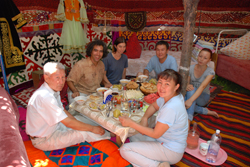
They invited us to a wedding in the evening where their daughter, Cholpan, was going to be dancing. We politely declined, preferring to get to the village closer to the park since we only had a couple days. So, Katya told Cholpan to put on one of the costumes they had hanging in the yurt, bring her cassette and show us one of her dances. She returned and did a beautiful Kazakh dance. Katya told us how at first she wouldn't allow her to dance, wanting her to focus on school work instead. However, her dance teacher convinced her, saying that Cholpan had talent. As soon as Katya agreed to let her take classes, the teacher placed her in the dance troupe
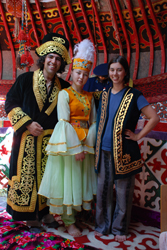
Alikhan and Katya drove us to the village of Tonkaris where we'd be staying. Nestled in yellow hills on the border of the Aksu Dzhabagly and Ugam national parks, the village was a serene place with a couple small rivers cutting through it. There were rows of tall, straight white poplar trees and pastures loosing their green in the hot summer sun. Beyond the village and pastures rise the mountains of the Ugam National Park.
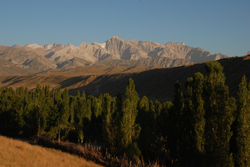
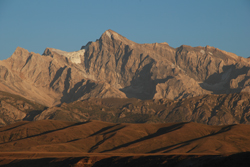
Our hosts, D and L, had recently finished a new house. In front of the house was a big mat full of grain drying in the sun. Occasionally a kid would turn a cartwheel through it.
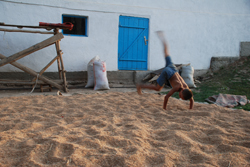
Behind the house was an open stable for the horses and cows as well as a pile of hay almost taller than the buildings.
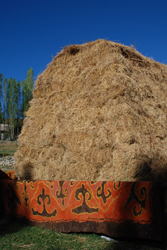
Evidently it was hay cutting season.
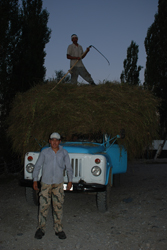
They had a raised porch with a carpet on it. On the edge hung a tray of kurut, a hard dried cheese product which tasted like very salty parmesan cheese with the tender consistency of a rock.
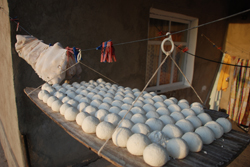
There were lots of children running around. Eventually I figured out they didn't all belong to the family. They only had 5 (the oldest 16 and the other 4 younger).
We proceeded to the living room, a huge room with a giant carpet covering the floor and several on the walls. There was one table set at one end and another leaning against the wall so they could probably seat about 20 people if the need arose. We went over the plans for the next couple days then sat at the table for kimis, fermented mare's milk made at home by L. It had a slightly tangy, smoky flavor. They warned us if you weren't used to it it could upset your stomach so I didn't drink much. (I didn't really care for the taste, anyway). We also gnawed on some kurt balls and had fresh cream on bread. L makes all the dairy products from milk from their animals.
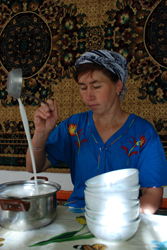
After Alikhan and Katya left, we took a short walk with our host's 16 year old son, up a hill to look at the view of the mountains.
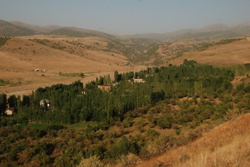
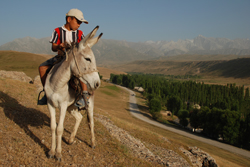
From the hill we walked down through apple orchards.
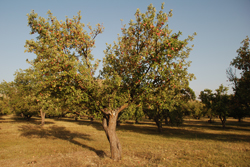
Then we came back for dinner--Kazakh beshparmak. The main difference, they said, between Kazakh and Uzbek beshparmak is the Uzbeks cut the noodles into neat pieces and use less meat. The Kazakh version Lydia made had a tasty sauce. The meat was from their own sheep including a garnish of fatty sheep butt.
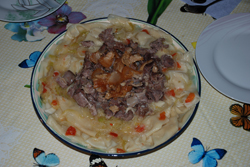
We talked a bit to our host and learned he had worked 20 years as a mountain inspector--from what I could tell it was sort of like a park ranger--at Aksu Djabaghly. His uncle held the same position for 30 years before him. By the end of dinner, L had made our beds--a few layers of soft mats on the floor-- which were quite comfortable.
The next day, after a breakfast of potatoes and mutton, we got ready for our hike. As we waited outside, D saddled up his horse. They set the youngest child on the horses back and the 2 year old immediately grasped the saddle. A few minutes later they took him off and he screamed and cried. I had at first thought the child had some kind of bone problem like a calcium deficiency since his legs were bowed out. In reality, it was from spending a lot of time on horseback. His parents confirmed that he loved being on horses. The children place blankets on the fence and play that they are riding horses.
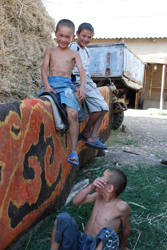
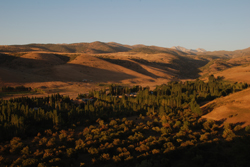
I saw one place a belt around a vertical metal pole on the patio and sit in front of it holding it like a set of reins. We are definitely in horse country. There are horses grazing in the fields everywhere.
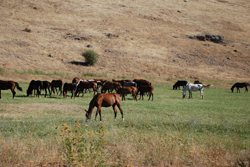
We were dismayed, however, to see that D was going to work and instead of having a guide with 20+ years of experience in the mountains, we were left in the hands of his son, a sullen 16 year old who obviously wanted to be doing something else. He set off without a word and we followed. We walked along the river into a gorge.
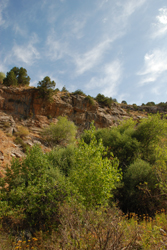
There was shade and coolness from the river. We scrambled up and down the rocky hillside. Our guide most of the time, rushed ahead of us, and a couple times Rowshan had to whistle and he'd reappear from behind a tree or in a cave. The cave was actually a kind of tunnel through the rock face. Eventually after our guide disappeared and we almost took a wrong trail, only to find him below us by a spring, I told him he needed to wait for us so we could walk together. Even when we walked together, he didn't say a thing: not a word about plants, birds, landscape or mountains. He didn't even know the name of the main peak: Sayramsky.
We walked to the top of the hill and saw eagles circling. The mountains stretched out in front of us, capped with glaciers.
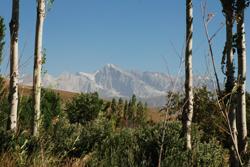
Though the hills were dry and had a surprising amount of prickly flora, we could imagine how beautiful the landscape must be in spring when everything is green. We drank from natural springs and walked along cow paths through the hills.
Our guide threw his pack down by a stream in a shady patch of the path and told us lunch was in the bag and he'd be back in half an hour. Then he disappeared, running up the path. Lunch was bread, eggs, cucumbers and kimis (which I passed on). We finished eating and waited but our guide didn't return. About an hour passed. Rowshan was pissed and said we should leave his bag and start walking. We started walking up the hill and from the top, and our guide came running down. He'd been having lunch with his friends who were with their horses. When he saw we were angry he made the excuse that he didn't have a watch. Rowshan walked ahead and said we didn't need him and we headed back to the village. He came with us anyway.
Back at the house, L asked how it went and we explained. She immediately guessed he didn't say anything about the surroundings. We told her we had decided to take a walk without the guide, up the hill we'd been to the evening before. Here we relaxed. The mountains were clearer than the evening before and the deep blue of the sky was set off by the yellow of the hills. Below the hill, the river rolled by grassy pastures tinted by the last breath of green. Horses grazed and we could hear sheep and donkeys. Back at the house we had tea and then had a Russian bath. Our hosts had a small Russian bath house. The children seemed fascinated by the fire in it and were always poking around it. The bath had wooden benches, a fire which heated a metal tank of water which, at the same time, filled the room with steam. My skin tingled when we went inside. I joked to Rowshan that we were cleaning ourselves with cow manure since that was what was fueling the bath house fire.
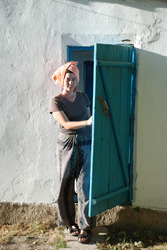
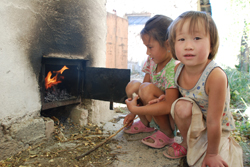
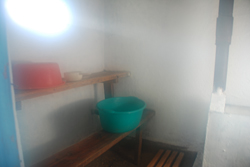
It was the first time Rowshan had been in a Russian bath. We both felt cleaner than we had been in ages. Rowshan told our hosts he felt like his bones were clean. The bath made us both feel better, however, something, maybe the spring water, maybe the unpasteurized dairy products, maybe an overdose of mutton had given me a very upset stomach, so I took it easy for the rest of the night.
This morning, I still wasn't feeling great. We requested a meatless breakfast. Our host also didn't have meat, which I felt a little bad about because it is such a big part of the Kazakh diet. WE talked about the average age of marriage in Kazakhstan: 20-22 girls, 22-25 boys. He did know some people who had been married for a while and didn't have kids. He also said people in the cities have smaller families.
D clarified his job. I had been wondering about my park ranger interpretation since the area had only been a national park for a few years. It turns out that his position could probably be more accurately described as a border control officer, keeping Kyrgyz hunters from trespassing and hunting in Kazakhstan territory. He also told us that Tokaris was the last village until Kyrgyzstan. A little to the South was Uzbekistan.
On our way back to Lenger, Alikhan stopped by a Russian Orthodox Church. It was an ornate brick building with metal onion domes, built in the late 19th century. The priest, with a long beard and long black robe, told us about the history and how the bricks were made a special way so they wouldn't break. He also said there was a holy spring down the hill which people said had curative properties.
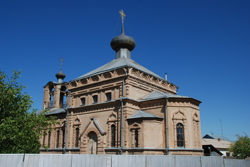
Then another man showed us the inside. It was fairly simple with clean painted walls decorated with framed prints and icons. The man showed us an icon of St. Nicholas and said that when they got it, it was solid black but it slowly "revealed itself" and with every year the colors became clearer and brighter. He showed us a darker icon of Mary which, he said, was in the process of revealing itself.
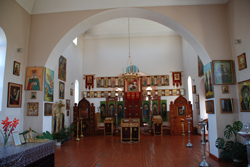
At the front of the church was an interesting icon of "the killing of the innocents." In the upper part was a cloud full of baby angels and below was the holy family fleeing from Herod. The man said couples who wanted children would pray and if couples were fighting then the icon would bring peace. He also said parents who were having trouble with their children, such as drug addiction, would pray to the icon.
The church had a pretty garden full of roses and an apple tree. As I was waiting for Rowshan to finish his photos, the priest asked if Rowshan and I were married. I said yes and then he asked the children question. When I said we didn't have children, he said, "Come with me." I figured he was going to make me pray next to the dead baby icon so I refused saying I didn't want children at this point in time. This brought on a lecture of how "children are a gift of God." He then told me I needed to go swim in the holy fountain and that they had a swim suit I could use. I flatly refused (imagining the embarrassment of taking a dunk and having a sudden attack of diarrhea in the holy fountain.) I also really did not want to swim in a holy fountain, especially one that was supposed to bring children. By this time I was ready to be on our way to Shymkent. We glanced down at the fountain where one man was bathing and several other were filling water bottles. A sign above it said it was a protected natural spot with a 5000 tenge fine for throwing trash.
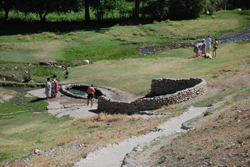
We soon were back in the car headed for Lenger. We kept having to swerve around cows and horses standing in the middle of the street.
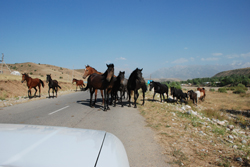
Alikhan said they stood in the road to avoid flies. In Lenger, we had a drop of tea before heading back to Shymkent. It was kind of a relief to be back in the hotel (now pleasantly mosquito free since they had gassed the place the day we left).
We crashed then went out for a bite to eat. We are both a bit tired. It is hard traveling in Kazakhstan. Things seem to take longer than they should. Well, hopefully tonight I'll get a good night's sleep. Tomorrow it is (hopefully) on to Taraz.
Comments
- Comments
Powered by My Blog 1.69. Copyright 2003-2006 FuzzyMonkey.net.
Created by the scripting wizards at FuzzyMonkey.net..
(Code modified by Rowshan Dowlatabadi)
Created by the scripting wizards at FuzzyMonkey.net..
(Code modified by Rowshan Dowlatabadi)

